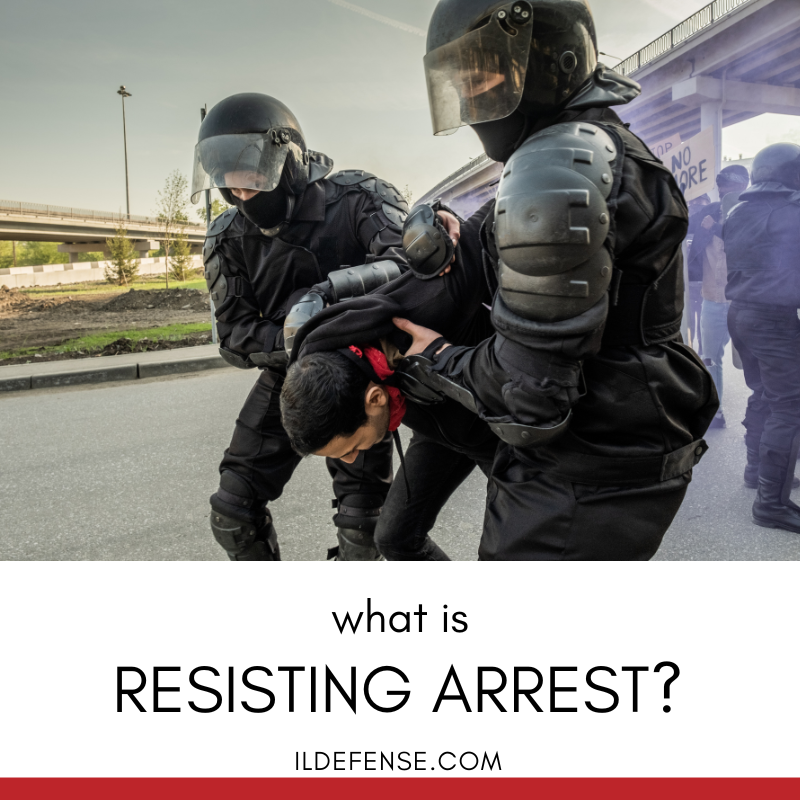
If you’re like many people, you know that resisting arrest is a crime of its own – and it can result in serious penalties. This guide explains resisting arrest, possible punishments, and ways your attorney may be able to defend you against these types of charges.
What is Resisting Arrest?
The bottom line is that in Illinois, if the police want to arrest you, you are required to let them do so. If you act in any manner to prevent the police from arresting you, you can be charged with resisting arrest. For example, you can be charged with (and convicted of) resisting arrest:
- If an officer attempts to handcuff you but you pull your hands away
- You fight back against police when they attempt to restrain you
- You run from the police when they want to arrest you
there are several other ways you can be charged with resisting arrest as well, but these are some of the most common actions that result in this criminal charge.
Under Illinois law, the actual criminal charge that governs this crime relates to “resisting or obstructing a peace officer, firefighter or correctional institution employee.” That means it applies to more than simply trying to avoid being arrested.
Related: What does “beyond a reasonable doubt” mean?
What Are the Penalties for Resisting Arrest in Illinois?
Resisting arrest is usually a Class A misdemeanor in the state of Illinois. That means you could go to jail for up to a year; the judge in your case could order you to pay heavy fines complete community service.
In some cases, resisting arrest is a more serious crime. For example, if a police officer is injured because you resisted arrest, you’re facing a Class 4 felony. The penalty for that is up to three years in prison and fines of up to $25,000.
Examples of Resisting Arrest
There are plenty of ways that the police can interpret your actions to be resisting arrest, but some of the most common include:
- Actual physical acts, such as fighting with a police officer or running away
- Giving a police officer fake identification
- Making threats toward a police officer who intends to arrest you
Related: The 3 worst mistakes you can make during a DUI stop
How Can Your Lawyer Defend You Against Resisting Arrest Charges in Chicago?
Your attorney may have several ideas on how to defend you against resisting arrest charges in Chicago and the surrounding communities. The best way for your lawyer to build a strong defense is to explain the entire situation – from start to finish. Some of the strategies your attorney may consider include:
- Unlawful arrest. The police must have a reason to arrest you, and if they don’t, you may not have resisted arrest.
- False allegations. Unfortunately, police sometimes accuse people of resisting arrest when they’re really not resisting at all. For example, if you’re rude to a police officer, swear or “talk back,” they may attempt to retaliate against you by filing these charges.
- Self-defense. Though this is a sticky situation to be in, you have the right to defend yourself against police misconduct. If an officer uses excessive force against you (as long as the officer’s force isn’t in response to forceful resistance from you), they may be breaking the law.
- The officer didn’t identify themselves as a police officer. If you don’t know someone is a cop, you have no reason to believe your arrest is real – and you can’t intentionally resist arrest if you don’t even know you’re being arrested.
There may be other ways your attorney decides to defend you against resisting arrest charges, too. Your attorney’s strategy depends on the circumstances of your case.
Do You Need to Talk to an Attorney?
If you’ve been accused of a crime, we may be able to help you – and don’t worry: It’s completely confidential. Call us at 847-920-4540 or fill out the form below to schedule your free, private consultation with an experienced and skilled Chicago criminal defense attorney now.
Contact Us
"*" indicates required fields









